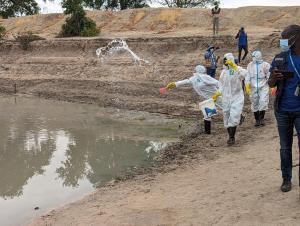WHO and Carter Center sign new agreement to accelerate the elimination of Guinea Worm in Angola
The World Health Organization (WHO) and the Carter Center have signed a new cooperation agreement, worth US$300,000, which guarantees the continuity of activities to fight Guinea worm disease in the province of Cunene. The agreement reinforces the commitment of both organizations to support Angola in eliminating this Neglected Tropical Disease (NTD), which is targeted for global eradication by 2030.
The signing of this agreement was driven by the long-term collaboration and advocacy with the Ministry of Health and the province of Cunene, which was strengthened during the Health Circle, a public dialogue promoted by the WHO in partnership with the Private University of Angola, which, in its second edition, highlighted the urgency of a collective effort to eradicate this disease.
The Carter Center is a key partner of Angola in this fight, providing technical and material support for community surveillance, mobilization, and awareness-raising among affected communities, as well as practical solutions such as water filters and larvicides, which are essential to interrupt transmission. This new funding will allow, for six months, the expansion and consolidation of ongoing actions, ensuring active surveillance of cases, community monitoring, training of local volunteers, and intensifying awareness campaigns in the most affected areas.
“This agreement proves that open and inclusive dialogue can translate into concrete commitments. The Health Circle was a catalyst for consolidating the partnership and securing the resources needed to move towards a dracunculiasis-free Angola,” said Dr. Indrajit Hazarika, WHO Representative in Angola.
Since 2018, Angola has reported 204 cases of Guinea Worm, three in humans and 201 in animals, specifically dogs. Although rare, the disease continues to affect vulnerable rural communities across Cunene and represents an obstacle to socioeconomic development. Transmission is strongly linked to the environment, especially stagnant water sources containing fleas infected with the parasite’s larvae, making a multisectoral response coordinated between health, education, environment, animal health, and infrastructure essential.
This agreement highlights the importance of international partnerships and community participation as drivers for accelerating progress. Continuing Guinea worm disease eradication activities represents a financial investment and a fundamental step toward protecting the most vulnerable populations and building more resilient communities.
The WHO and the Carter Center thus reaffirm their commitment to supporting Angola in meeting the global goal of eradicating Guinea Worm by 2030 through a multisectoral response based on strong partnerships and the leadership of local communities.



